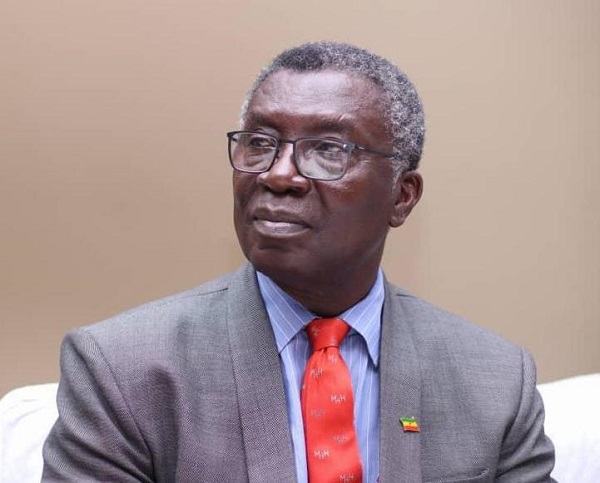
West African vaccine manufacturers have called on the heads of governments, health ministers, ministers of industries and relevant ministries to make a stronger political commitment to local vaccine production in the region.
They made the call in a statement signed by the chairman of the Ghana Presidential Vaccines Committee, Prof. Kwabena Frimpong- Boateng and made available to newsmen today (May 19, 2022).
Frimpong- Boateng said that the stakeholders in vaccine manufacturing in West Africa under the leadership of the Economic Community of West African States (ECOWAS), West Africa Health Organisation (WAHO) and Africa Centre Disease Control (Africa CDC) met in Accra, Ghana from May 10 to 11, 2022 to discuss collaborations to ensure the production and availability of quality, safe and efficacious vaccines in the region.
He said that the main objective of the high-level meeting was to create a framework for collaboration and information exchange and develop a framework for vaccines in the region.
Frimpong- Boateng pointed out an urgent need to harmonise NRAs and the establishment of the ECOWAS Regional Medicines Agency (ECOMA) linked to Africa Medicines Regulatory Harmonisation (AMRH) and Africa Medicines Agency (AMA) to support the implementation of the continental strategy in line with the framework for action of PAVM/Africa CDC.
He said that this discussion should start with plans to develop strategic stockpiles and distribution plans to support national vaccination programmes. “We agreed on types of vaccines to be produced in the region. Diversification of vaccines products (combining child immunisation programmes and adult vaccination programmes that will require demand generation) and help support manufacturers,” he said.
The chairman disclosed that this includes 22 identified vaccines which were further divided into three based on current and planned vaccine manufacturer’s capacities and capabilities; short-term (yellow fever vaccines, anti-snake serum, COVID-19 vaccines, pentavalent, rabies, measles, ebola, typhoid, lassa, rotavirus, tetanus and polio vaccines (IPV) – 2022 to 2024), medium-term (human papillomavirus (HPV), pneumococcal (PCV3), polio vaccine bOPV-4 (oral), malaria, measles MMR, BCG, hepB-pediatric, meningitis A and 2025 -2027) and long-term (anti-cancer, 2028 to 2030), depending on the period of production.
He emphasised the need for collaboration among manufacturers to prevent duplication of efforts and called for a focus on building sustainable bio-manufacturing capacity to meet regional health needs.
“Such an aspiration will require a completely new way of thinking than what is currently being planned. It should be borne in mind that multiple Fill and Finish plans for COVID-19 vaccines outstrip the needs or current demands.
“For example, the current mRNA technology will need to be utilised to develop other priority diseases. The region can work closely with Partnerships for African Vaccines Manufacturing (PAVM) which will have oversight of vaccine manufacturing activities in the region and the continent,” he said.
Frimpong- Boateng said ECOWAS countries and partners should deliberately support manufacturers to de-risk their investments, finance/funds.
“For example, advance purchase commitments, grants, soft loans and other regional or country-specific incentives. Strengthening routine immunisation programmes will also demand locally manufactured vaccines,” he said.
He said that ECOWAS/WAHO should play the role to build human resource capital/training, supporting research development, infrastructure /equipment, logistics and market-shaping (design) and technology transfer.
“Research and development (R&D) capacity available in the region needs to be strengthened and utilised in a complementary fashion, to fulfil gaps in the vaccine R&D value chain on the African continent.
“Further, the great potential regional organisations offer in manufacturing and R&D talent development should be fully explored and utilised to support the continental needs,” he stated.
According to him, WAHO/ECOWAS should establish pool procurement to guarantee the offtake of vaccines in the region.
“That will mean that countries will have to quantify their national needs, pool it across the region and use that to provide an advanced market commitment to the industry over extended periods – at least five years. This way the industry will be able to manage idle facilities,” he said.
He called on the WAHO/ECOWAS to consider endorsing and engaging in a continentally-pooled procurement mechanism. He added that this would help drive the continental ambition of growing vaccine manufacturing across other regions as well.
“ECOWAS governments should work to enhance existing trans-border trade policies to enable the sale of vaccines within and across the region [and there should be] support from WHO to coordinate for optimal implementation of activities on the continent.
“There is the need to strengthen individual NMRAs regulatory systems in the ECOWAS region and improve on current good manufacturing practices (cGMP) to international standards for the sustainability of the vaccines manufacturing,” he said.
He also called on ECOWAS/WAHO to engage stakeholders, as well as technical and financial partners to fund vaccine manufacturing in the region.
“National vaccine manufacturing plans should be aligned with the regional and continental plans to prevent duplication of efforts. ECOWAS/WAHO should follow up with stakeholders to ensure that the regional priorities are achieved.
“Market fragmentation will kill all interventions to get vaccines and biologics to the market. Market approvals must be regional at the minimum, or continental.
“There’s a need that this becomes the immediate area of work for ECOMA and AMRH/AMA. Regional or continental approval decisions will have to be domesticated by individual countries,” he added.

